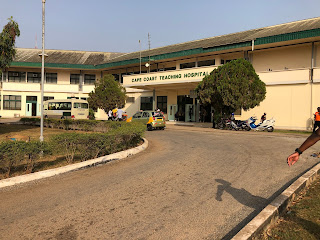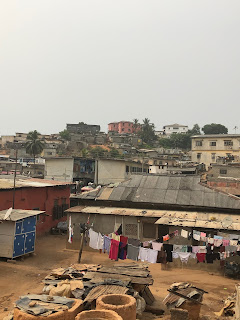Limited Resources
Hi all! Miss you all so much, but I am still embracing the new experiences and journeys halfway across the world. This week I started my rotation at the hospital. I will be doing one week of Internal Medicine and two weeks in the Pediatric ward. I posted a picture below of the Cape Coast Teaching Hospital. It looks much smaller than it is. The main hospital which is what you see holds the Accident and Emergency Ward (A & E ward) and outpatient services. Behind the main hospital are the various wards. There are male and female wards, a children's ward, surgical wards, OBGYN ward, and a delivery suite. I have shadowed residents during rounds where the disease processes have ranged from Deep Vein Thromboses (DVTs) to Malaria to HIV to Meningitis. Africa overall has a lot more communicable diseases than we actually see in the US. For example, during my year and a half of clinical rotations in the US, I have never actually seen meningitis. There are 4-5 cases in the hospital in Cape Coast currently.
What has struck me most over the last few days is the resources that we take for granted in the US. Yesterday, I was working with the resident on duty in the A&E ward when a patient came in with right-sided paralysis and unable to communicate. We did as much as we could before getting the family involved, but as most of my medical colleagues know a CT scan of the head is urgent. A head CT scan must be payed for up front as insurance does not cover it in Ghana. Luckily the family had money to provide to cover the cost. We found a huge bleed on the left side of the brain. The ER doctor taught us a lot during this case. Once we saw how extensive the bleed was involving the cerebral hemisphere, he said because we are in Ghana there really is nothing they can do. There are neurosurgeons here in Ghana, but they can only manage an epidural or subdural bleed. Once a bleed involves the grey and white matter of the brain, surgery here is not an option. Just two weeks ago, in Pennsylvania a patient had a similar presentation with the same bleed. He however was transferred to a bigger hospital where he underwent brain surgery to stop the bleed. Today the patient has deteriorated with a GCS (Glasgow Coma Scale) score of 6. In the US, if a patient had a GCS less than 8, we would not hesitate to intubate the patient and put them in the ICU, but here the patient's family has to pay for certain things before they are even attempted. This patient will likely be dead within 1-2 days because the resources needed are not available here. During this case, I asked if TPA which is what we use to treat an ischemic stroke in the US is available here. Sadly, it is not. TPA has been shown to stop and reverse many of the deficits caused by a stroke and is readily available in almost any US hospital. Here in Ghana, once a patient has a stroke, their blood pressure is monitored and controlled, and they are referred to physical therapy if they survive. It is very heartbreaking to know that medications that can save lives are not available here because it's still a third world country. Medication and surgery should be available to everyone around the world who needs it.
I write all of this to say that I know we all complain about the US healthcare system, but keep in mind that you have access to the best care in the world that so many others do not have. Keep this in mind the next time you want to complain about a certain medication not working or how expensive medicine is. At least you can get it.
What has struck me most over the last few days is the resources that we take for granted in the US. Yesterday, I was working with the resident on duty in the A&E ward when a patient came in with right-sided paralysis and unable to communicate. We did as much as we could before getting the family involved, but as most of my medical colleagues know a CT scan of the head is urgent. A head CT scan must be payed for up front as insurance does not cover it in Ghana. Luckily the family had money to provide to cover the cost. We found a huge bleed on the left side of the brain. The ER doctor taught us a lot during this case. Once we saw how extensive the bleed was involving the cerebral hemisphere, he said because we are in Ghana there really is nothing they can do. There are neurosurgeons here in Ghana, but they can only manage an epidural or subdural bleed. Once a bleed involves the grey and white matter of the brain, surgery here is not an option. Just two weeks ago, in Pennsylvania a patient had a similar presentation with the same bleed. He however was transferred to a bigger hospital where he underwent brain surgery to stop the bleed. Today the patient has deteriorated with a GCS (Glasgow Coma Scale) score of 6. In the US, if a patient had a GCS less than 8, we would not hesitate to intubate the patient and put them in the ICU, but here the patient's family has to pay for certain things before they are even attempted. This patient will likely be dead within 1-2 days because the resources needed are not available here. During this case, I asked if TPA which is what we use to treat an ischemic stroke in the US is available here. Sadly, it is not. TPA has been shown to stop and reverse many of the deficits caused by a stroke and is readily available in almost any US hospital. Here in Ghana, once a patient has a stroke, their blood pressure is monitored and controlled, and they are referred to physical therapy if they survive. It is very heartbreaking to know that medications that can save lives are not available here because it's still a third world country. Medication and surgery should be available to everyone around the world who needs it.
I write all of this to say that I know we all complain about the US healthcare system, but keep in mind that you have access to the best care in the world that so many others do not have. Keep this in mind the next time you want to complain about a certain medication not working or how expensive medicine is. At least you can get it.


Shay, thank you for sharing your experiences with us here in the US. How sad to know things we take for granted and feel entitled to are not options to others in this world. As I pray for the patient you are speaking about I also pray that the conditions and availability of health care improves for so many across the world. Continue to make us proud as on your journey. Prayers always for you and your safe return home my dear ❤️
ReplyDelete